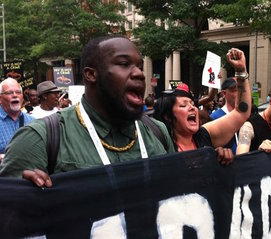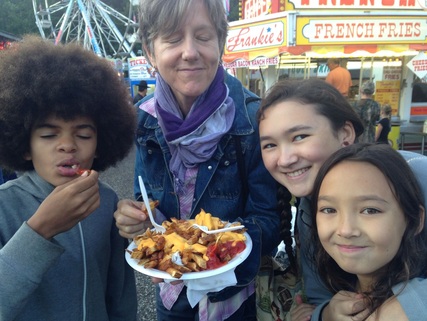
... to act accordingly. Without persistent intervention, we are very well trained to do so.
The interview video of Darren Wilson is a stark reminder. The child (he invited us into the psyche of his 5 year old self) was clearly raised to be white and encouraged to adopt all the co-occurring neurosis ~ by the look of things, under threat of violence.
While failing to indict Wilson is another harsh indignity for Brown’s family and community, his conviction would not be enough to transform the treatment of black youth by white police. Period.
About the time that I met Allen, I started to frame social injustices just like that with no forward movement. After 20 some years of organizing for just HIV and drug policy, small gains no longer felt like building the bridge as we walk it.
A few years later, Tuesday and I entered the inquiry that launched this blog, What is the next conversation in social justice activism? This small opening was born of a deep desire to get unstuck after decades of anti-oppression trainings and campaign-based activism proved to be not enough to end institutional violence against people of color, even within the social justice organizations that we had created.
In the light of the organizing around Ferguson, Staten Island, Cleveland… it’s time for a new question. It needs to be something about what it will take for white America to really see what's going on right in front of us.
Through Allen, I was able to hear early #blacklivesmatters activists tell the story of the formation and experience of the first ride to Ferguson. They are bold, decentralized, networked. They center healing and understand complexity. Their messages are heartfelt, grounded in legacy with enough analysis to add precision. Their tactics are grassroots, high tech, media savvy and effective.
It sounds a bit like the best of Occupy, but there are very core differences: The originators are young, black, brown, feminist and queer and intersectionality is both lived (personal) and understood strategically (political). And so many others are following them.
We often are invited to gape at Wilson-style backwardness (“it looks like a demon”) and rarely hear a collective gasp about the more subtle manifestations of middle and upper class whiteness training. The liberal version showed up at Occupy where the white and educated spoke loudly and authoritatively about anti-oppression theory while, too often, not being able to see, hear or work with the people of color standing next to them, especially when they were poor and/or without college education.
There have been smart, educated, beautiful, polite black kids for hundreds of years. The advantage that my children have is that my children are encountering the nicest white people America has ever produced. Let’s hope America keeps producing nicer white people… [who own] their actions. Not even their actions. The actions of your dad." Chris Rock, New York Magazine, December 2014
Looking into Wilson's baby blues is a but for the grace of god go I kind of experience. Due to consistent and multi-level interventions ~ church, school, family and, perhaps most transformative, from people of color on the frontlines ~ I have come to see a nephew or a friend when I look at Mike Brown. Brother Wilson was trained otherwise. As a result of almost 30 years in grassroots driven HIV and drug policy work, when I look at #blacklivesmatters activists, I have learned to see teachers, political allies, friends and leaders. Anti-oppression training and its analysis of victimization made me smarter, but it did not give me this point of view. Learning to show up without all the answers did.
The bottom line is, I don’t trust white people to lead when transformative change is what is needed. It’s just not possible for us to understand the whole as individuals or as leadership teams, collectives, board of directors, etc. We still have a lot of learning to do about being nicer to people and tougher on systems.
I very much trust #blacklivesmatters to move us forward. They see so much about us all. And to transform things, my gut tells me we still need to figure out how to stand together and ask:
Look at this mess, what are we going to do about it?
#powerbeyondprivilege
#transformnotregulate
#analysisisnotrelationship
#thinkingtogether

 RSS Feed
RSS Feed